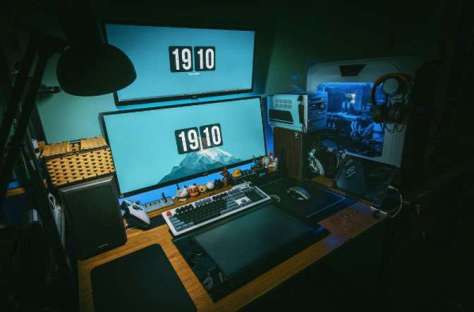In the intricate tapestry of video game design, visuals often take center stage, captivating players with stunning graphics and immersive worlds. However, amidst the dazzle of high-definition landscapes and lifelike character animations, one crucial element often goes unnoticed—the role of sound. While it may seem like a background player in the grand orchestra of gaming, sound holds a remarkable power to shape the player experience and drive engagement in ways that are often overlooked. From the subtle rustle of leaves in a serene forest to the thunderous roar of explosions on the battlefield, sound breathes life into virtual realms, enriching gameplay and deepening player immersion.
The Power of Audio Immersion
At the heart of sound’s impact on gameplay lies its ability to immerse players in the virtual worlds they inhabit. Unlike other sensory inputs, such as visuals, which often remain at a distance, sound has a unique way of enveloping players, drawing them into the very fabric of the game environment. Consider a horror game where every creaking floorboard and distant whisper sends shivers down the player’s spine or a racing game where the roar of engines and screech of tires make them feel as though they’re hurtling down the track at breakneck speeds.
Enhancing Gameplay Through Audio Feedback
Beyond mere immersion, sound plays a pivotal role in enhancing gameplay mechanics and providing vital feedback to players. From the satisfying “ping” of a successful headshot to the ominous growl of an approaching enemy, audio cues serve as invaluable tools for guiding player actions and decisions. In competitive multiplayer games, where split-second reactions can mean the difference between victory and defeat, sound cues like footsteps and gunfire can tip the scales in favor of the most attentive players.
Emotional Resonance and Narrative Impact
Sound has a profound ability to evoke emotions and imbue games with narrative depth, serving as a powerful tool for storytelling and character development. Just as a film score can heighten the drama of a pivotal scene or evoke a sense of wonder in an epic adventure, so too can sound shape the emotional arc of a video game narrative. From melancholic melodies that underscore moments of loss and tragedy to triumphant fanfares that accompany heroic victories, the soundtrack of a game can evoke a wide range of emotions, enriching the player’s emotional journey and deepening their investment in the narrative.
Accessibility and Inclusive Design
In addition to its impact on gameplay and immersion, sound also plays a crucial role in ensuring accessibility and inclusivity within the gaming community. For players with visual impairments, audio cues can provide essential navigational aids and gameplay feedback, allowing them to engage with games on equal footing with their sighted counterparts. Similarly, for players with auditory impairments, visual alternatives such as subtitles and vibration feedback can help bridge the gap, ensuring that all players can enjoy a rich and rewarding gaming experience.
The Evolution of Audio Technology in Gaming
The impact of sound on gameplay and player engagement has only been amplified by advancements in audio technology, which have enabled developers to create increasingly immersive and realistic gaming experiences. From the early days of simple MIDI tracks and rudimentary sound effects to the modern era of surround sound and dynamic audio engines, the evolution of audio technology has revolutionized the way we experience games. Websites like soundful.com have played a pivotal role in this evolution, providing developers with access to cutting-edge tools and resources for creating high-quality audio assets that elevate the gaming experience to new heights. Whether it’s the spatial audio of virtual reality environments or the adaptive soundtracks of procedural generation, the possibilities for audio innovation in gaming are virtually limitless, promising even more exciting developments in the years to come.
Psychological Effects of Sound on Player Engagement
Beyond its technical and aesthetic merits, sound also exerts a profound influence on the psychological state of players, shaping their attitudes, emotions, and behaviors in subtle yet significant ways. Studies have shown that certain types of music and soundscapes can enhance concentration, increase arousal, and evoke specific emotional responses, all of which can contribute to greater player engagement and enjoyment. For example, fast-paced music with a driving beat may increase feelings of excitement and motivation during intense action sequences, while ambient sounds like gentle rain or chirping birds can promote relaxation and immersion during exploration segments.
 In conclusion, the impact of sound on gameplay and player engagement cannot be overstated. From its ability to immerse players in virtual worlds and enhance gameplay mechanics to its capacity for evoking emotions and fostering inclusivity, sound plays a multifaceted role in shaping the gaming experience. As technology continues to advance and developers explore new frontiers in audio design, the possibilities for innovation are endless. By recognizing the power of sound as an unseen hero of gaming and harnessing its potential to captivate players’ senses and emotions, we can create richer, more immersive, and more rewarding gaming experiences for players around the world.
In conclusion, the impact of sound on gameplay and player engagement cannot be overstated. From its ability to immerse players in virtual worlds and enhance gameplay mechanics to its capacity for evoking emotions and fostering inclusivity, sound plays a multifaceted role in shaping the gaming experience. As technology continues to advance and developers explore new frontiers in audio design, the possibilities for innovation are endless. By recognizing the power of sound as an unseen hero of gaming and harnessing its potential to captivate players’ senses and emotions, we can create richer, more immersive, and more rewarding gaming experiences for players around the world.


